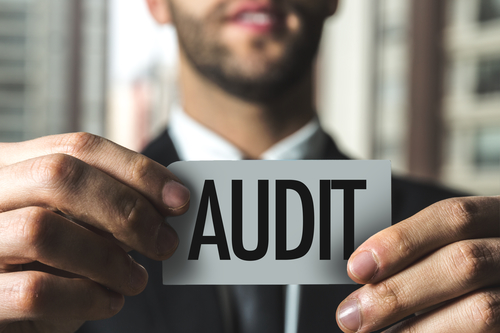
Avoiding An Audit-Look For the Red Flags!
The Red Flags You Should Know About!
No one likes to receive the “Dear Taxpayer” letter so, here are some tips for avoiding that letter and having to go through a tax return examination or full-blown audit. Remember, if your return is selected for an unusual item or, item of interest, that allows the IRS a 2nd look and it usually snowballs from there.
The higher your income the higher the chance of an audit. This is America, land of capitalism. We love making money. The more the merrier! But, you should be aware that if you have adjusted gross income (AGI) of over $200,000 there is a 1.70% or, 1 in 59 chance of being audited. If your AGI is under $200,000 that stat becomes 0.65% or, a 1 in 154 chance of audit.
The failure to report a foreign bank account can lend itself to an audit. Anyone with a foreign bank account which has over $10,000 in it on 12/31 each year must file a form FinCEN 114 by 4/15.
Do not leave any income off your tax return.Remember the IRS receives all copies of forms 1099 and W-2. Make sure these are reported appropriately on your tax return. A mismatch sends an automatic red flag!
The IRS compares deductions to your income. If they appear high for your income they will select your return for review.
Many returns with a form or forms schedule C draw an audit. Particularly cash-intensive businesses such as hair salons, bars, restaurants, taxi drivers, & car washes. Make sure you have all documentation for your income & expenses for a schedule C.
Reporting large charitable deductions as compared to your income is a big red flag. Keep supporting documents and make sure to get an appraisal for large ticket items. Do not forget to file form 8283 when you have non-cash deductions over $500.
Rental losses are of interest to the IRS and it is because a majority of taxpayers report them as if they are real estate professionals. There are no deduction limits for a real estate pro as there are for individuals however, to be a real estate pro you must spend at least 750 hours per year doing real estate activities. For non-pros there is a $25,000 maximum passive activity loss which can be deducted against ordinary income if your AGI is $100,000 or less. This deductible loss phases out at AGI of $150,000.
Be careful when deducting business meals, travel & entertainment. Oft times these expenses are exaggerated and can draw an audit Don’t be deduction greedy!.
Alimony deductions can be a bit problematic because there is one “rule” that a lot of accountants & attorneys fail to comply to and that is that the alimony must stop upon the death of the former spouse. If that stipulation is not within a divorce decree or separate maintenance agreement, then it is not alimony and cannot be deducted by the payer. And remember, the recipient must report alimony received on his or her tax return and pay taxes on it.
Hobby losses cannot be deducted on your tax return! This is no-no for sure. The law states that you must report any hobby income and you are allowed to deduct losses up to that income but those losses cannot result in a deductible hobby loss.
Gambling winnings are reported on a form W2-G. The IRS receives a copy of these so do not leave gambling winnings off of your tax return. You can deduct gambling losses up to gambling winnings on schedule A, itemized deductions, miscellaneous and not subject to the 2% floor. However, if you cannot itemize (long form), you cannot deduct any gambling losses.
The home office deduction is reviewed often. If you have a home office it must be a dedicated space, meaning not your kitchen or dining room . The office has to be used for meeting with customers and running your home based business. You cannot claim a home office deduction if you are employed and provided an office at your place of employment. Unless you are required by your employer, for your employer’s convenience, you cannot take this deduction. If your employer requires that you work from home, then again, the space must be dedicated and you must have written proof from your employer.
US taxpayers who work overseas can exclude $102,100 (2017) of foreign income if in fact they establish a residence in that country and spend 330 days there over a 12 month period. This is an exclusion for foreign income paid by a foreign country. This is NOT an exclusion for a US taxpayer being paid by a US company for working abroad.
Automobile business use is something to be mindful of because a vehicle is not 100% business use deductible if you are able to drive it back & forth to work. In order for a vehicle to be deemed 100% business use, it remains at the office when you leave the office and you get into your personal vehicle to drive home.
Early or, premature distributions from an IRA or 401 (k) plan can cause a “look see” by the IRS and that is because 40% of the taxpayers who received early distributions (before age 59 1/2) did not include the 10% early distribution penalty on their tax returns.
Suspicious cash activities must be reported on form 8300 “Report of Cash Payments Over $10,000 Received in a Trade or Business. If you engage in currency transactions of $10,000+, it will be reported by the business receiving the cash. This will result in the IRS contacting the taxpayer for an audit and obviously this is to try to keep a handle on the underground economy. Examples would be buying a car and putting down a $10,000 cash deposit. Walking into a bank and depositing $10,000+ into a checking or savings account.
Day-traders beware! To be a legit day-trader you must buy & sell frequently and look to make money on short-term savings. If you are a legit day-trader you can report income and claim expenses on schedule C as a true self-employed business. However, if you are not considered a “real” day-trader and you dabble in this sort of thing, any losses must be reported on schedule A (long form) under miscellaneous deductions which are subject to a 2% floor.
